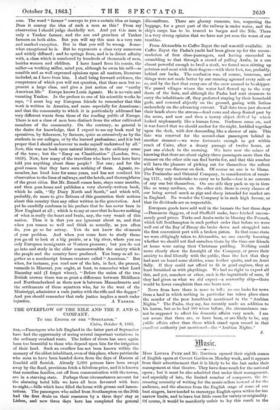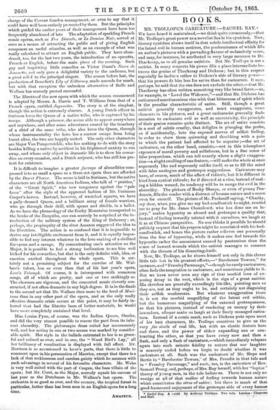MUSIC.
Miss Louisa DYNE and Mr. Harrison opened their eighth season of English opera at Covent Garden on Monday week, and it appears from their advertisement that it is likely to be the last under their management at that theatre. They have done much for the national opera ; but it must be also admitted that under their management, and especially of late, the limited number of composers, the in- creasing necessity of writing for the music-sellers instead of for the audience, and the absence from the English stage of some of our best singers, have tended to stereotype English opera within far too narrow limits, and to leave but little room for variety or originality. Of course, it would be manifestly unfair to lay this result to the
charge of the Covent Garden management, or even to say that it could have well been entirely prevented by them. But the principles which guided the earlier years of their management have been too frequently abandoned of late The adaptation of sparkling French comic operas, such as Fra Diavolo, or Le Domino Noir, served at once as a means of attracting the public and of giving English composers an useful stimulus, as well as an example of what was really calculated to attract an English public. They have aban- doned, too, for the last two years, the introduction of an operetta, French or English, before the main piece of the evening. Such gay and inspiriting little comedies as Victor Al use's Noces de Jcannate, not only gave a delightful variety to the audience, but a great relief to the principal singers. The season before last, the production of Benedict's Lily of Killarney. made amends for much, but with that exception the unbroken alternation of Balfe and Wallace has scarcely proved successful.
The libretto of the new opera with which the season commenced is adapted by Messrs. A. Harris and T. Williams from that of a French opera, entitled Jayuarita. The story is of the simplest, though the action is extremely obscure. A young Dutch officer in Surinam loves the Queen of a native tribe, who is captured by his troops. Although a prisoner, she seems able to appear everywhere and anywhere, and after some adventures caused by the treachery of a chief of the same tribe, who also loves the Queen, through whose instrumentality the hero has a narrow escape from being burnt alive, the two are happily united. The only other characters are Major Van Pompernickle, who has nothing to do with the story besides killing a native by accident in his frightened anxiety to run away, and whose only object in dramatic life is to show his cowar- dice on every occasion, and a Dutch serjeant, who has still less pre- text for existence.
It is difficult to imagine a greater farrago of absurdities com- pressed into so small a space as a three-act opera than are afforded by the Desert Flower. The scene is laid in Surinam, but the native characters are all North American Indians, who talk of " prairies," of the " Great Spirit," who vow vengeance against the "pale faces'' after the style of the approved fashion of Mr. Fenimore Cooper's heroes. Instead, however, of wretched squaws, we have a gaily-dressed Queen, and a brilliant array of female warriors, who go through their drill, with spears and shields, in a ballet. As we have the phraseology of the Rocky Mountains transported to the banks of the Esequibo, one can scarcely be surprised at the in- troduction of the military system of the King of Dahomey ; or, perhaps, the propinquity of the river Amazon suggested the idea to the librettists. The action is so confused that it is impossible to derive any intelligible excitement from it, and it is equally impos- sible to feel any interest whatever in the love-making of a civilized European and a savage. By concentrating one's attention on the Major, it is possible to feel a strong inclination to see him well kicked for his cowardice, but that is the only definite wish, idea, or emotion excited throughout the whole opera. This is cer- tainly not a promising subject for the exercise of Mr. Wal- lace's talent, less so even than that of his last year's opera, Love's Triumph. Of course, it is interspersed with numerous songs, all of which are pretty, and one or two strikingly so. The choruses are vigorous, and the concerted music cleverly con- structed, if not often dramatic in any high degree. It is in the finale to the second act that Mr. Wallace rises more to the level of Mari- tana than in any other part of the opera, and as the only really effective dramatic crisis occurs at this point, it may be fairly in- ferred that had the libretto been of better materials, he would have more completely sustained that level.
Miss Louisa Pyne, of course, was the Indian Queen, Oanita, and did the very utmost possible to rescue the part from its inhe- rent absurdity. The picturesque dress suited her uncommonly well, and her acting in one or two scenes was marked by consider- able spirit. Her style in the ballads entrusted to her is as grace- ful and refined as ever, and in one, the " Wood Bird's Lay," all her brilliancy of vocalization is displayed with full effect. Mr. Harrison is so accustomed to lover's parts, that there is little to comment upon in his personation of Maurice, except that there is a lack of that recklessness and careless gaiety which he assumes with such advantage in several of his favourite characters. Mr. Weiss is very well suited with the part of Casgan, the bass villain of the opera; but Mr. Corri, as the Major, scarcely equals his success of last year as the Dutchman in Mr. Wallace's last opera. The orchestra is as good as ever, and the scenery, the tropical forest in particular, better than has been seen in an English opera for a long time.
AmAnun.































 Previous page
Previous page